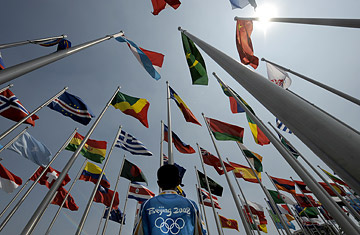
A volunteer looks at flags at the Olympic Village in Beijing.
It's the General Assembly of jocks, some 16,000 athletes and coaches from around the world packed into 40 high-rise buildings, sprawled across 160 acres at the northwest corner of Beijing's Olympic Green. Look, there goes the Hungarian judo team, in red-and-white warm-ups! The South African badminton players, with their green and gold, share a sidewalk with the blue-clad Cuban shooter. Is Crayola an Olympic sponsor? It's a massive, multicolored gathering of young, strong and attractive athletes, a place where the food is free, the parties are plentiful, and the — well, let's just say the competition for the attention of the opposite sex is often fiercer than the play on the field.
Forget about all the sweating for those silly medals. For a glimpse of how the world really comes together in Beijing, and has quite a swell time, you need to visit the Olympic Village.
Unfortunately, you and I can't throw the discus a million miles, so we're not invited to the bash. But the Village's "International Zone," home to dozens of shops, park space and a square where the Olympic flag-raising ceremony takes place, is more accessible and offers a taste of what life is like for an Olympian. Wander around and talk to enough athletes, and you'll sense that the Beijing Village is scoring high marks. The athletes' rooms are relatively spacious, and amenities like swimming pools are a nice touch. Despite the smog overhead, the trees and gardens spaced around the Village ensure a greener feel than in Athens. "In Greece, it was a dust storm," says Canadian boxer Adam Trupish. "You can tell China was prepared." Russian water-polo player Sofya Konukh raves about the TVs and easy Internet access in the Village. "I don't want to say anything bad about Sydney or Athens," she says. "But it's better here."
A popular destination is the hair salon, where stylists shout at passersby offering a can't-miss deal: a trim, wash and blow-dry, for the unbeatable price of zero yuan. "They wrap you in," says Canadian field-hockey player Ravinder Kahlon. "They're like 'Hair! Wash!' Next thing you know I'm getting a cut." You need the right 'do for the medal stand, don't you? (And to impress that stunning Brazilian volleyball player.) Plus, too thick a coif can slow you down in the Beijing heat.
Wait, is that the lanky Utah Jazz forward and Russian basketball star Andrei Kirilenko in the chair, knees almost hitting his chin? Why, yes it is. You'll never see LeBron in the salon, since the U.S. basketball team is once again shunning the Village, opting for the comforts of Beijing's five-star InterContinental hotel. Kirilenko, who will make $15 million this season, says the Village facilitates team bonding, but he won't knock the U.S. for its élitism. "You get used to doing things a certain way," he says. "It's all right." With basketball's popularity booming in China, Kirilenko is an icon in the Village. After his trim, dozens of Olympic volunteers rush up to him, begging for autographs and pictures. Amazingly, two Chinese beach-volleyball players almost faint in his presence. The Russian graciously fulfills every wish, though with dwindling enthusiasm. "There are only 10,000 volunteers," he says with a sarcastic smile, "so there are only 10,000 autographs."
Next to the salon is something called the "Environmental Information Center," a place where earnest volunteers hand out pamphlets trumpeting the green features of these Games. Shockingly enough, while the barbershop was buzzing on Wednesday evening, not a single athlete paid its well-meaning neighbor a visit. You will not hear a Hungarian judoka say to his teammate, "Great practice today, man. Gosh, I'm exhausted. Want to head down to the Environmental Information Center to unwind?" Gold trumps green in the Olympic Village.
The Village has other flaws besides boring office space. Many athletes snap photos of each other standing before an oversized picture of the Temple of Heaven. The mural is right beside a public toilet, which somehow takes something away from the mystique. And as much as the Olympic Village sports a bacchanal tradition — at the Albertville Winter Olympics in '92, condom machines had to be refilled every two hours — things seem relatively staid. Boo. Since every athlete, in theory at least, could win a medal right now, it makes sense that folks are playing it cool at the moment. "It'll be a way better experience if you're not sloshed the whole time," says Canadian archer Jay Lyon. Not that Lyon has a choice — since alcohol is a depressant and could keep a jittery marksman calmer, beer is considered a performance enhancer in archery. He can't sip a drink for a month. Smart rule: drunk archers can't be good for their fans either.
For those who can legally imbibe, this Village might be less accommodating to the night trawlers than the frat house that was Sydney. "There could be more fun," laments Adamantia Thanou, a physiotherapist for the Greek team. "In Sydney, people were out and about after midnight the entire time. Here, there's nothing going on." Thanou is probably not the best source. First, as a Greek, she has higher nightlife standards: dinner starts at about 3 a.m. in Athens. Plus, it's easy for the trainer to push for parties: What race is she running the next morning? Thanou should be patient — once competitions end and athletes lose, they'll want to let off some steam. "I'm saving myself," says Croatian shot-putter Nedzad Mulabegovic, whose event takes place on Aug. 15. "And once I'm done, I'll be all over the place."
Perhaps it would be unreasonable to expect that, even as the Opening Ceremonies creep closer, the Olympians can think sports 24/7 in the Village. After swearing off extracurricular activity, Trupish, the Canadian boxer, and Kahlon, the field-hockey player, huddled with two countrymen and walked toward the square. "Maybe we can find that girl," one of them said.
